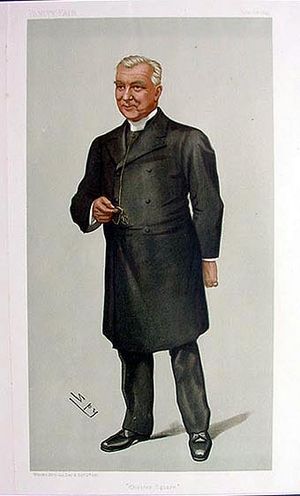James Fleming (priest) facts for kids
James Fleming (1830–1908) was a well-known Irish priest in the Church of England. He was a great public speaker and helped raise money for good causes. He served as a special priest, called a canon, at York Minster. He also became a chaplain to Queen Victoria and later to Edward VII, meaning he was a religious advisor to the royal family. He was a close friend of the British royal family.
Contents
James Fleming's Early Life and Education
James Fleming was born in Carlow, Ireland, on July 26, 1830. He came from a Scots-Irish family. He was the youngest of five children. His father, Patrick Fleming, was a doctor.
From 1833 to 1836, James lived in Jamaica because his father worked there for the army. After his father died in 1838, his mother moved the family to Bath, Somerset, England. His two older brothers, William and Francis, also became priests.
James went to King Edward VI's Grammar School, Bath in 1840. Later, in 1846, he attended Shrewsbury School. He was good at cricket there. In 1849, he started studying at Magdalene College, Cambridge. He earned his first degree in 1853.
Becoming a Priest and Church Leader
James Fleming became a deacon in 1853 and a priest in 1854. He first worked as a curate (an assistant priest) in Ipswich from 1853 to 1855. Then he moved to Lansdown until 1859. People liked his clear and simple sermons.
In 1859, Fleming started classes to teach working people how to speak well. He also strongly supported total abstinence, meaning he believed people should not drink alcohol.
In 1866, he became the leader of Camden church in Camberwell. In 1873, he was chosen to be the vicar of St. Michael's Church, Chester Square. He stayed there for the rest of his life. He also became a chaplain to the Duke of Westminster. During his time at St. Michael's, more local churches and schools were built. A place for people to recover from illness was also created.
Fleming was very interested in helping others. He supported Dr. Barnardo's Homes, which helped children in need. He was also a secretary for the Religious Tract Society, which published religious books. His church also gave a lot of money to the Hospital Sunday Fund each year.
In 1879, he was made a special priest, called a residentiary canon, at York Minster. He was given more important roles there in 1881 and 1883.
Later Life and Royal Connections
James Fleming was offered important church positions, but he turned them down. He was offered to become the first Bishop of Liverpool in 1880, but another person was chosen instead. He also said no to becoming the Bishop of Sydney in Australia in 1884. Later, he declined offers to lead the cathedrals in Chester and Norwich.
Fleming became an honorary chaplain to Queen Victoria in 1876. He became a full chaplain to her in 1880 and to Edward VII in 1901. From 1879, he often preached (gave sermons) to the Queen and Prince of Wales at Sandringham.
From 1880, Fleming taught preaching and public speaking at the London College of Divinity. He also advised on setting up Westfield College, a college for women. He was chosen three times to give special lectures, known as the William Jones lectures.
Fleming was a strong supporter of traditional Protestant beliefs. He spoke out against some newer church practices. He had good relationships with leaders from other Christian groups.
James Fleming passed away on September 1, 1908. He was buried in Kensal Green cemetery. People remembered him for his friendly personality and excellent speaking skills. A special altar screen and choir stalls were placed in St. Michael's church in his memory. A statue of King Edwyn was also placed in York Minster.
James Fleming's Writings and Recordings
James Fleming wrote several books. His book Bath Penny Readings (1862) was about a popular movement where people would gather to read aloud for a small fee. He also published a guide called The Art of Reading and Speaking (1896). He wrote a book about Queen Alexandra in 1901 and published some of his sermons.
One of his sermons, Recognition in Eternity, was preached in memory of the Duke of Clarence in 1892. It became very popular, selling about 67,000 copies by 1911. The money he earned from this book went to charities chosen by Queen Alexandra.
Fleming also made some of the earliest sound recordings for the Gramophone & Typewriter Ltd company. He recorded readings from famous poems and literary works. His recording of Edgar Allan Poe's The Bells showed his amazing control of his voice. A famous language expert, Daniel Jones, even used Fleming's recording to study how people speak. He also started recording a church service in 1908 but passed away before finishing it.
Family Life
James Fleming married Grace Purcell on June 21, 1853. She was the daughter of Admiral Purcell. Grace passed away in 1903. They had three sons and three daughters together.
 | Toni Morrison |
 | Barack Obama |
 | Martin Luther King Jr. |
 | Ralph Bunche |


